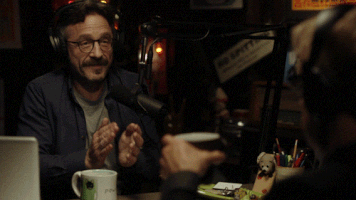Podcasts, much like blogs, serve as both a personal outlet for creativity and a content-based attention grab for businesses and entertainment personalities alike.

What kinds of podcasts are out there?
There are interview-based podcasts such as shows like WTF with Marc Maron or You Made It Weird with Pete Holmes, news programs such as NPR Politics or BBC World Service Global News, and even news-entertainment hybrids like NPR’s Serial.
There are tech podcasts, the list of which is seemingly endless, geared to do everything, all the way from introducing you to the latest gadgets to providing you with a step-by-step process for how every bit of tech is thought up and built.
There are comedy podcasts with every possible sub-genre, interviews, improv, standup clips, you name it—it’s out there. And if you want to hear something really meta, yes, there are even podcasts about podcasts.
The business world of podcasts is equally fascinating, with shows like Planet Money (a textbook NPR example of the correlation between hard-hitting economic facts and detail-oriented tales of financial gain, loss, adventure, and everything in between), Girlboss Radio, and my personal favorite, Salt of the Earth, a show about business owners with a strong sense of humor and an even stronger work ethic.
What role can podcasting play in marketing?
In true internet-age form, if you can think of it, someone is podcasting it. And just like online, if it doesn’t exist, you should be the one to create it. Blogging has followed this same law to the letter: there are blogs on every conceivable topic, every niche. It’s no wonder people are utilizing these tools more and more, their benefits to business are immeasurable. (Just check out a podcast at the intersection of podcasting, business, and blogging: HubSpot’s The Growth Show.)
Having a blog or a podcast can provide a form of advertising for your service, while giving you the opportunity to stand out on any given search engine. It can give you the opportunity to be paid by other companies to advertise themselves alongside your product or service, and perhaps most importantly, it can give you the time and space you need to thoroughly and clearly represent your business and ideas on your own terms, to any and every potential customer. Customers want to be informed, and now, you have the means to inform them, through various content channels.
While podcasting in some form or another has existed since the dawn of the internet, we owe the majority of our gratitude for podcasting, as the art form it has grown into, to smartphone technology. iPhones now come installed with the Podcasts app, a core app that cannot be removed, much like Mail or Stocks (seriously, Apple, please let me delete Stocks! My phone is full and I want to download more podcasts. What am I, a Rockefeller?! LET ME DELETE STOCKS). Not only do we have this basic Podcast app, there are also new apps that may better suit your podcast style. Apps such as Overcast can be downloaded from the Apple app store to adhere to the more specific desires of the podcast aficionado.
Now that smartphones exist, we can all enjoy the comforts of the internet on-demand. We can immediately download things like music or podcasts, but we can also visit our favorite websites and blogs with the push (er, touch) of a button.
Interestingly enough, blogs actually began around the same time that podcasts did. Blogging began shortly after people began keeping internet diaries and journals, and quickly developed into the content we know and love today. Creating and publishing content, whether it be a personal passion or a business venture, has clearly become one of the most important parts of modern business.
Here at BlogMutt, we all have our own favorite podcasts. In fact, we all have more than one. Not only are podcasts popular, they’re definitely addictive. A poll of our office has proven to me once again what a ragtag bunch of information-hungry superstars we are. Every one of us seemed to follow a pretty podcast-hip formula: at least one interview show, at least one news program, and at least one (but usually several) entertainment or niche subject podcasts that satisfy a personal passion or interest.
Essentially, people tend to use podcasts for exactly the purpose they’ve grown to fulfill: any need, any want, anytime, anywhere.



